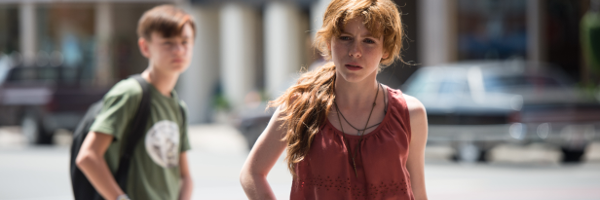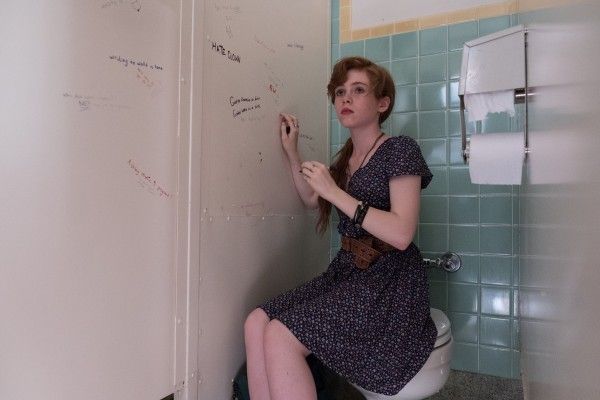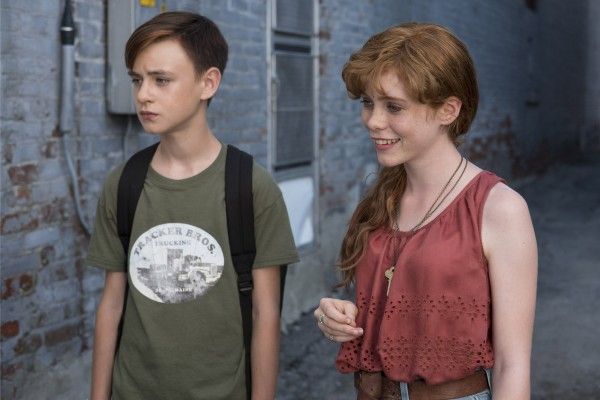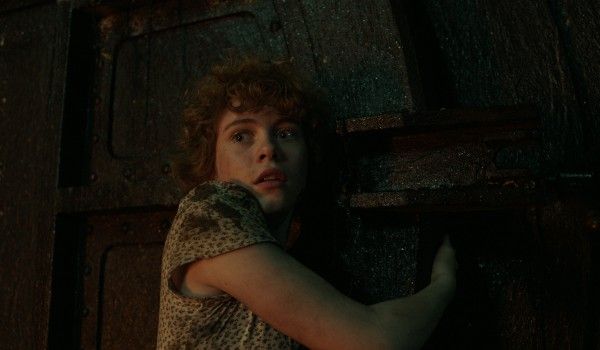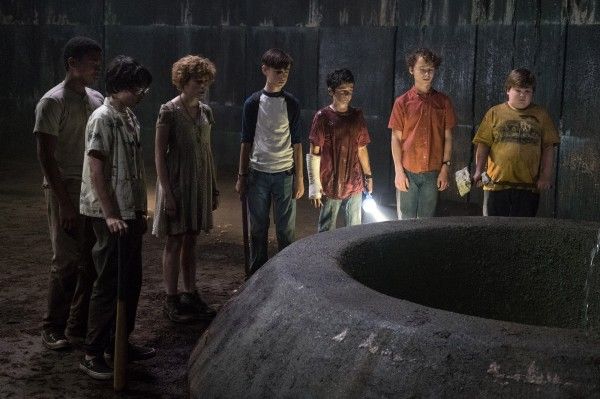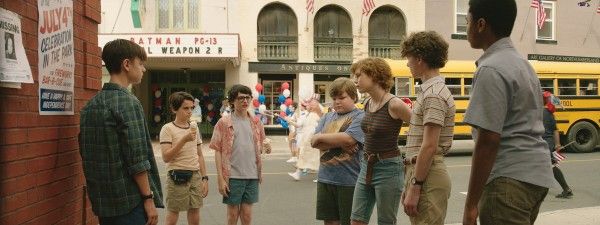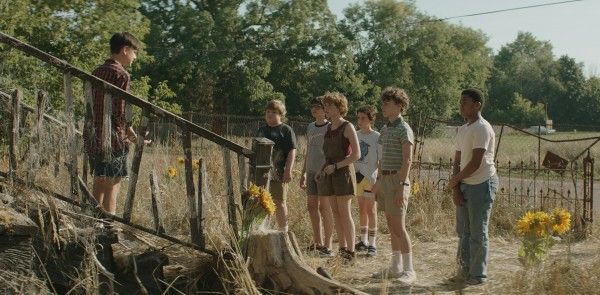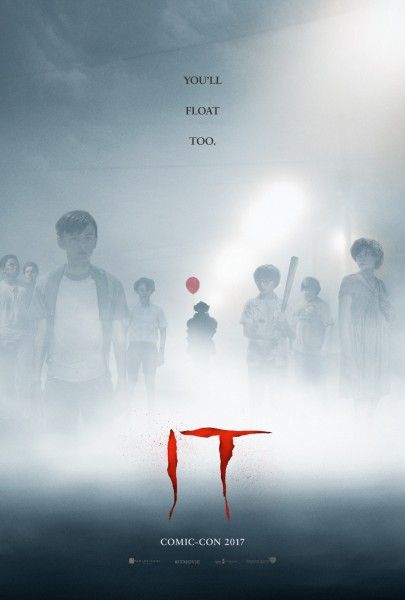Be aware there are spoilers for IT (2017) and Stephen King's 1986 novel.
There's something evil in Derry, Maine. Lurking in the sewers, traveling freely through the homes, and corrupting the world around It, an ancient, malevolent force returns every 27 years to sow the seeds of fear and feast on the flesh of Derry's citizens. But there's another sinister force at work; a much more mundane form of evil that casts a blind eye to the suffering, or worse yet unhitches its belt behind closed doors to bring even more pain to the innocent. There's no cosmic power to this evil, but it's immortal in its own way, passed down through generations in the form of racism and abuse, corrupting the purity and goodness of everything it touches as easily as It inspires violent chaos. While the Losers of Stephen King's IT are all battling their personal demons as they race through the streets Derry, hunting a child-eating monster, Beverly Marsh alone goes home every day to find another monster waiting inside her house. If the other kids can run home and lock their doors, keeping the bullies at bay, Beverly is only locking herself in with something much worse.
Her horror is too real, too familiar. Unlike It, who torments his prey in many guises, flipping through glamours to take the form of whatever terrifies It's victims most, Beverly's monster always wears the same face -- that of her father. As written in King's novel, Beverly's journey through abuse was as progressive as it was problematic, a portrait of a complicated woman who escapes the abuse of her childhood only to fall prey to it again as an adult, wrapped up and overshadowed by IT's infamous ending, in which Beverly reclaims her sexuality by having sex with all of the Losers, one after the next, cementing their bond and affirming their transition into adulthood. Naturally, Andy Muschietti's film adaptation has no such scene, that's unfilmable, but it shares all the essential factors with the source material, premier among them the willingness to acknowledge and validate teen sexuality as a real and powerful force.
Being a teenage girl is a perilous time, even without a child-eating space clown gnawing through your town like a virulent, degenerative disease. If coming of age is an awkward, all-consuming experience for young men, it's a seismic, unparalleled transformation for young women; beautiful but horrifying, and traditionally veiled in the insidious secrecy of social decency. It's the shocking moment when unprepared girls wake up with blood in their underwear; the moment when the men who used to see you as a child to be protected look at you with a new and often unwelcome glint in their eye, and when women jaded by the loss of their own youth begin to see you as a threat.
Muschietti's film gets this transformation, understands the weight of it, and treats it with respect and unfettered honesty usually reserved for pensive dramas. Don't get me wrong, Beverly's arc isn't perfect in the film, unfortunately undercut by some poor third act shortcuts (we'll get to that), but that acceptance of the innocence and maturity that co-exist within this young woman is worthy of investigation and celebration. Rarely has nascent female sexuality been treated with such candor, even in the unflinching horror genre, which has too often been among the most guilty parties in exploiting teenage sexuality without offering any insight.
In King's novel, we first meet Beverly as an adult, in a pivotal moment of bedraggled triumph as she wrenches free from the hands of her abusive husband, battered and bruised, and steals away into the night. Her journey through abuse is told in tandem, her childhood and adult battle for enfranchisement intertwined in overlapping passages of time. Muschietti's film bisects the narrative into two parts, focusing solely on the childhood arc for the first film, so our understanding of the character becomes something different, only half of the character's true arc. But that focus also gives the material potency in exploring the experience of a maturing young woman. When we meet Beverly in the film, she's at that wildfire liminal age, on the cusp of womanhood she neither fully understands nor desires, rejecting it even as she learns to use it to her advantage. When the boys need a quick escape, Bev flirts with the pharmacist and he reacts too indulgently, a shark's grin peeking through his veneer of friendliness.
That element has conjured up some ire in viewers, who see the film's male gaze as embracing outdated tropes and exploiting a teenage girl. I would argue the opposite. The male gaze is an essential part of Beverly's experience, perhaps the defining factor in the ills that plague her. To be clear, not the factor that defines her, but defines her fears. IT is all about fear. Likewise, criticisms have been lobbied that the focus on her gendered experiences deprives her of an equal place in the narrative, but again I'm the contrarian. Muschietti lets Beverly's arc be an unabashed exploration of girlhood and womanhood, making the female experience central in a genre that has long been focused on boys becoming men.
Muschietti's film shows us how she is seen, but more importantly, it shows us how she sees. When Beverly strips down and jumps into the quarry, we're not only seeing the wonder of the young boys enraptured by her fearlessness and beauty, we're seeing a woman defiantly unashamed of her body despite the barrage of shame beset on her by all sides. There has some criticism regarding the skin-baring nature of that scene, which I find especially odd considering she's surrounded by five equally disrobed young men. To me, that speaks more to our own hangups with the female body and the insistent, potent fear of a young woman's sexuality.
Beverly may have that confidence when she's surrounded by her friends, but that doesn't mean she's gotten away unscathed. She feels like the same girl she's always been, but the world is shifting around her as she comes of age. And so, as we learn when she confronts It for the first time, Beverly's great fear is her burgeoning womanhood. And who wouldn't be terrified if their father leered at them that way the moment he saw tampons in your hands. As a response to that encounter, she hacks off her hair, but we all have to grow up, and womanhood isn't so easy to reject. When It comes to her in her bathroom, her hair shoots back out of the drain, binding her, and in a none-too-subtle metaphor, blood roars out of the sink, painting the room red. Of course, her father can't see it, and her trauma is invalidated once again.
Beverly isn't just tormented at home -- though in a change up from King's novel, the film makes her father's abuse even more blatant. In the book, Mr. Marsh is attracted to his daughter, but his attacks are rooted in violence. The film heavily implies this version of the character has indulged more than just his thoughts. It's a change I distinctly disliked in Cary Fukunaga's draft, bur Muschietti tones it down and weaves it into her arc in a way that makes sense without fetishizing her victimization. That abuse travels out with her into the world, where she has earned an unjust reputation as the town slut, despite being a virgin -- the nefarious, hungered rumor-mongering that plagues young women without the pedigree, wealth, or parental support to shield themselves. And it's not just the kids -- the adults whisper too. But like many survivors, what doesn't kill her makes her stronger.
There's no denying that Bev, as depicted in the film, is the strongest of the losers, and Muschietti reinforces that sentiment with impressive regularity. Played with verve and nuance by Sophia Lillis, who is all but guaranteed to become a star after her transcendent breakout performance in IT, Bev seems as if she's lit within -- an important factor when so many people try to stamp out her self-worth at every turn, and she commands the screen. She is strong in kindness; the way she treats Ben like a friend rather than the New Kid. She is strong in courage; always the first to run into danger to do the right thing, whether it's the moment they realize Mike has fallen into the hands of Psychotic bully Henry Bowers or the first time the Losers venture to Niebolt Street and only Beverly would rather join Bill to confront the monster than hide. She wants to be running towards something. She's tired of running away. She's also strong in physicality; driving a steel rod through Pennywise and sending a rock flying straight into Henry's face with perfect aim. Beverly is just strong, in every way that counts.
In that way, Muschietti makes interesting choices that cement Beverly as the hero and true leader of the Losers. King has long had a history of creating characters that more of less exist as his avatar; rational, good-hearted men, usually writers, who lead the action. In IT, that's Bill, ostensibly the lead character in the packed ensemble, who drives King's novel. But Muschietti shifts that dynamic. For one thing, Bill is not hunting the monster for justice, he's looking for his younger brother, who he thinks might still be alive. It's a small shift, but it drains some of his heroism. To the contrary, Beverly is given some of Bill's heroic beats, including glimpsing the deadlights, and her pathos drives the story just as much as Bill's grief. Beverly isn't along for the ride, she's co-piloting the ship.
Which is what makes it so unfortunate that the third act bungles the landing. There's no two ways about it, the film's final act relegates Bev to the role of damsel in distress, taken hostage by the big bad and held captive in his lair until the cavalry comes riding in, literally saving her with Ben's true love's kiss. The kiss itself is cringey and too romanticized, missing a beat in the conversation about consent. The choices make sense, but only because they are easy. The concept of true love's kiss may seem out of place in a film about a killer clown, but Pennywise's defeat is built on the power of belief. Ben believes he will revive her, and so he does. Bam, problem solved, track laid for Chapter 2. The Losers needed to get down to the sewers, and as the glue that binds them together, Beverly is the quickest route to do so. Done, easy. But again, Beverly is the bravest of the bunch, and she should have been leading the charge side-by-side with Bill. That particular misstep is understandable because in defeating her father, Beverly has essentially completed her arc in the film. She has faced her fears and won. She is no longer afraid. Now, the boys, ever a step behind her confident courageousness, need to do the same. Understandable, but disappointing all the same, a bit of truly sloppy shortcutting in a film that gets so much right.
Beverly leaves IT in a moment of intimacy; a shared kiss with Bill. It's a big moment for both; for Bill, who leaves behind his grief and summons the guts to do the one thing left to scare him, and for Bev, who has a moment of romance and sexuality that is pure and innocent and sweet, stripped of all the bullshit that's been put upon her. Bill kisses her first, but more importantly, she kisses him back smiling. Victims of assault and abuse often feel like they've had their sexuality robbed from them, but Beverly's is still hers to control.
When we leave Beverly, she is on the path to gaining that control, leaving her father and the twisted town of Derry behind for the relative safety of Portland. But, again, It was never the only evil force at work in Beverly's story, and only half of her story will be told. If her coming of age narrative was tricky, her adult story is even tougher. Young Bev chooses the Losers, chooses to fight and leave, but the next time we see her, she will have chosen a man just as bad as not worse than the one she escaped. It's a tough arc, and King himself didn't seem to know what to do with it, giving adult Beverly the short shrift, but if IT shows us one thing, it's that even if Muschietti and his creative team don't get it just right ,they will treat her experiences as real and valid, and they will do something interesting and honest with a character they clearly love.

